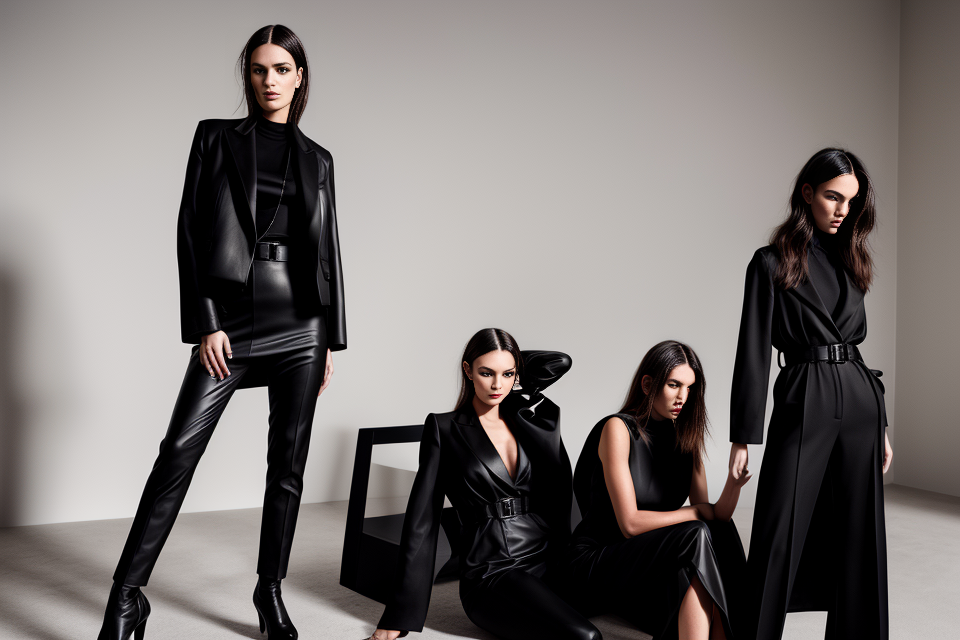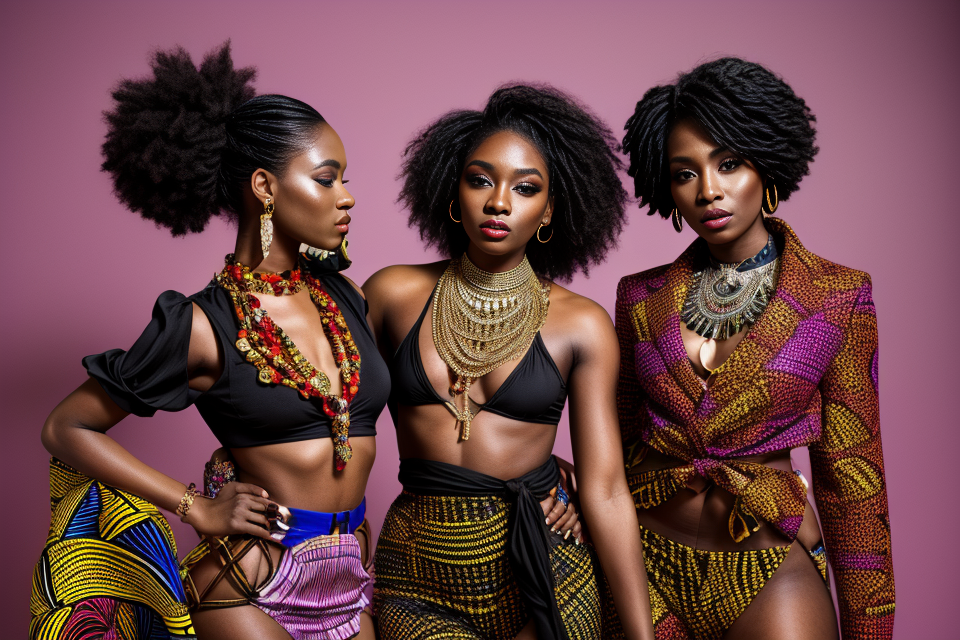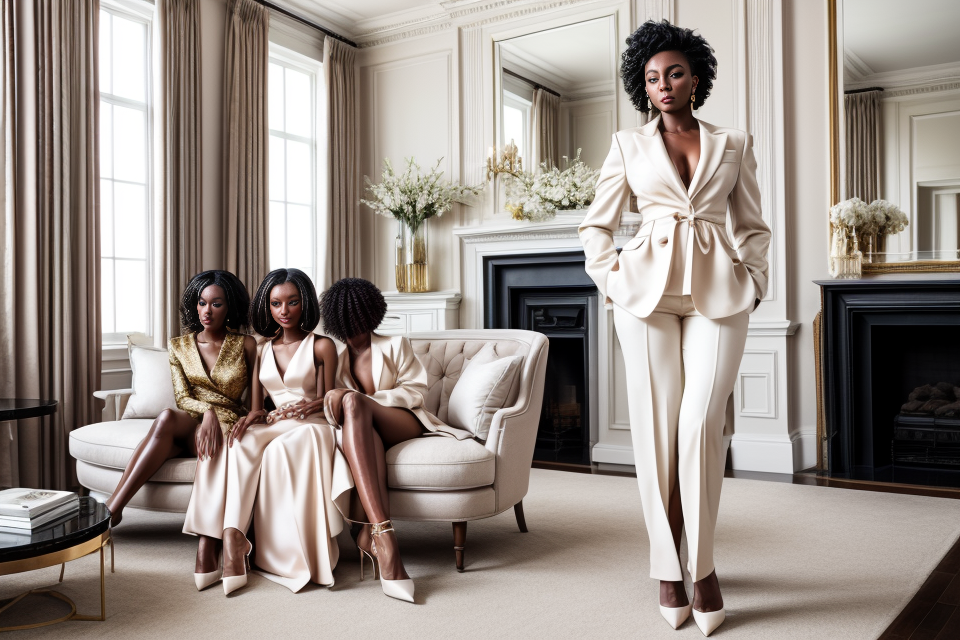The power of black in fashion cannot be overstated. From the runways to the streets, black has become a staple color in fashion, symbolizing everything from sophistication to rebellion. But what is it about this color that has made it such a powerful force in the world of fashion? In this article, we’ll explore the influence of black culture on fashion and how it has shaped the way we dress today. From the bold statements of hip-hop to the timeless elegance of classic black, we’ll take a deep dive into the history and significance of this iconic color in fashion.
The History of Black Culture in Fashion
The Emergence of Black Style Icons
SlavesGotStyle: The Secret Fashion History of Enslaved People
- Clothing as a form of resistance and self-expression
- The significance of homemade and second-hand clothing
- The role of slave quilts in communication and storytelling
Black Dandyism: The Art of Defying Stereotypes Through Fashion
- The dandy as a symbol of black empowerment and self-determination
- The evolution of the dandy aesthetic in different eras and contexts
- The impact of black dandyism on mainstream fashion and cultural norms
These subheadings delve into the historical context of black culture’s influence on fashion. The first subheading, “SlavesGotStyle,” examines the secret fashion history of enslaved people and how they used clothing as a form of resistance and self-expression. This includes the significance of homemade and second-hand clothing, as well as the role of slave quilts in communication and storytelling.
The second subheading, “Black Dandyism,” explores the art of defying stereotypes through fashion. This includes the history of the dandy as a symbol of black empowerment and self-determination, as well as the evolution of the dandy aesthetic in different eras and contexts. Additionally, the impact of black dandyism on mainstream fashion and cultural norms is discussed.
Overall, these subheadings provide a comprehensive look at the historical roots of black culture’s influence on fashion and the ways in which black individuals have used fashion as a means of self-expression and empowerment.
The Impact of Black Music and Dance on Fashion
Black music and dance have had a profound impact on fashion trends throughout history. From the jazz age to hip hop, black musicians and dancers have influenced fashion in a way that has shaped the industry as we know it today.
From Jazz Age to Hip Hop: How black music has shaped fashion trends
During the jazz age, black musicians were at the forefront of fashion trends. They wore sharp suits, fedoras, and pinstripe suits, which became a staple of the era. These musicians were not only fashion icons but also helped to popularize the style of jazz music that would go on to become a cultural phenomenon.
In the 1970s, the rise of disco music led to a new wave of fashion trends. Black musicians such as the Jackson 5 and Donna Summer helped to popularize the disco look, which featured platform shoes, bell-bottom pants, and bright colors.
In the 1980s, hip hop music took the world by storm, and with it came a new style of dress. Black rappers such as LL Cool J and Run-DMC popularized the look of oversized jackets, gold chains, and high-top fades. This style became a staple of hip hop culture and was soon adopted by mainstream fashion.
The art of movement: How black dance styles have influenced fashion
Black dance styles have also had a significant impact on fashion trends. The moves of black dancers have inspired fashion designers to create clothing that is both functional and stylish.
One example of this is the influence of the “running man” dance move on athletic wear. The “running man” was popularized by black musicians in the 1980s, and it inspired designers to create clothing that was both comfortable and practical for exercise.
Another example is the influence of black dance styles on streetwear. Streetwear fashion is heavily influenced by black culture, and many of the styles that are popular today, such as oversized t-shirts and baggy jeans, were inspired by the looks of black rappers and dancers.
In conclusion, black music and dance have had a profound impact on fashion trends throughout history. From the jazz age to hip hop, black musicians and dancers have helped to shape the industry as we know it today. Their influence can be seen in everything from the clothes we wear to the music we listen to, and it will continue to shape the fashion industry for years to come.
The Power of Black in Fashion
The Significance of Black-Owned Fashion Brands
- Empowering Black Entrepreneurs
- The fashion industry has traditionally been dominated by white designers and business owners, which has resulted in a lack of representation for black people in the industry. Black-owned fashion brands are breaking down these barriers and providing opportunities for black entrepreneurs to succeed in the industry.
- By creating spaces for black people to work in and lead, black-owned fashion brands are fostering a more inclusive and diverse industry.
- Celebrating Black Culture
- Black-owned fashion brands are using their platforms to celebrate and showcase black culture. They are incorporating traditional African fabrics, styles, and patterns into their designs, and using their collections to tell the stories of black people around the world.
- This celebration of black culture is important because it allows black people to see themselves represented in the fashion industry, and it also helps to educate others about the richness and diversity of black culture.
- Challenging Stereotypes
- Black-owned fashion brands are challenging stereotypes about what is considered fashionable and desirable. They are pushing boundaries and redefining what is considered “normal” in the fashion industry.
- By presenting their unique perspectives and styles, black-owned fashion brands are expanding the definition of fashion and helping to create a more inclusive and diverse industry.
- Creating Jobs and Economic Opportunities
- Black-owned fashion brands are creating jobs and economic opportunities in their communities. They are providing employment for black people and contributing to the growth of the black economy.
- This economic empowerment is important because it helps to address the economic disparities that exist between black and white people in the United States.
- Shaping the Future of Fashion
- Black-owned fashion brands are shaping the future of fashion by paving the way for more black designers and business owners to succeed in the industry. They are breaking down barriers and creating a more inclusive and diverse industry.
- By building a strong presence in the fashion industry, black-owned fashion brands are helping to ensure that black people have a seat at the table and a voice in shaping the future of fashion.
The Representation of Black Models in Fashion
- The history of black models in fashion
- The early days of black models in fashion, such as Naomi Campbell and Tyra Banks, who broke barriers and paved the way for future generations.
- The evolution of black models in fashion, with a growing number of models of diverse ethnicities and backgrounds represented on runways and in campaigns.
- The significance of black models in challenging traditional beauty standards and promoting inclusivity in the fashion industry.
- The impact of black models on fashion campaigns and runways
- The role of black models in pushing for greater representation and diversity in fashion, both on and off the runway.
- The impact of black models on fashion campaigns, including their ability to connect with audiences and challenge traditional beauty standards.
- The growing recognition of the importance of diversity in fashion, with more brands and designers embracing the power of black models and the impact they have on the industry.
Fashion as a Form of Resistance
The Politics of Black Fashion
Fashion has always been a powerful tool for political expression, and black culture has played a significant role in shaping the way people think about politics and social justice through fashion.
One of the earliest examples of black fashion as a form of political protest was the Black Panther Party’s use of clothing as a way to assert their identity and challenge the status quo. The party’s iconic black berets and leather jackets were not only a symbol of their commitment to social justice, but also a way to project a sense of power and strength in the face of oppression.
In more recent times, black fashion has continued to be a powerful force in social justice movements. The #BlackLivesMatter movement, for example, saw protesters using clothing as a way to communicate their message and raise awareness about police brutality and systemic racism. Protesters wore t-shirts, hoodies, and other clothing bearing slogans like “I Can’t Breathe” and “Black Lives Matter” to demonstrate their solidarity and support for the movement.
The power of fashion in social justice movements cannot be overstated. Clothing can be a powerful form of self-expression, and when used in the context of political protest, it can be a powerful tool for raising awareness and effecting change. The influence of black culture on fashion has been significant in this regard, as black designers, models, and activists have used their platforms to promote social justice and challenge the status quo.
In conclusion, the politics of black fashion have played a significant role in shaping the way people think about politics and social justice. From the Black Panther Party to the #BlackLivesMatter movement, black fashion has been a powerful tool for political expression, and its influence on the world of fashion cannot be ignored.
The Celebration of Black Identity in Fashion
The fashion industry has long been a platform for Black individuals to celebrate and express their cultural identity. This celebration has taken many forms, from the rise of Afrocentric fashion to the significance of cultural appropriation in fashion.
The Rise of Afrocentric Fashion
Afrocentric fashion is a style that incorporates elements of traditional African dress and culture into modern fashion. This style has gained popularity in recent years, as more designers and consumers seek to celebrate and honor the rich history and culture of Africa.
Afrocentric fashion is not just a trend, but a form of cultural expression that allows Black individuals to connect with their roots and celebrate their heritage. It has also served as a means of reclaiming and reinterpreting traditional African garments and textiles, which have often been misrepresented or appropriated by mainstream fashion.
The Significance of Cultural Appropriation in Fashion
Cultural appropriation refers to the taking of elements of one culture by another culture, often without understanding or respect for the original context or meaning. In the fashion industry, cultural appropriation has been a contentious issue, particularly when it comes to the use of traditional African textiles and styles by non-Black designers and consumers.
The appropriation of Black culture by non-Black individuals and companies has a long history in the fashion industry, often resulting in the erasure of Black creators and the exploitation of Black culture for profit. However, the rise of Afrocentric fashion and the growing awareness of cultural appropriation has led to a push for greater representation and respect for Black culture in the fashion industry.
Overall, the celebration of Black identity in fashion is an important aspect of the broader movement for racial justice and representation. By embracing and celebrating Black culture, the fashion industry can begin to address its history of exploitation and disrespect, and work towards a more inclusive and equitable future.
The Future of Black Culture in Fashion
The Influence of Social Media on Black Fashion
In recent years, social media has played a significant role in the rise of black fashion influencers. These influencers have leveraged platforms such as Instagram and TikTok to showcase their unique styles and bring attention to the diverse range of black fashion trends.
The impact of social media on black fashion influencers has been transformative. With the ability to reach large audiences and engage with fans from around the world, these influencers have been able to build a loyal following and establish themselves as authorities in the fashion industry. As a result, they have become an important force in shaping the future of black fashion.
Moreover, the rise of social media has also allowed for a more democratic approach to fashion, with smaller designers and independent brands able to gain exposure and build a following. This has helped to create a more diverse and inclusive fashion industry, where a wider range of voices and perspectives are represented.
However, the future of black fashion in the digital age is not without its challenges. With the constant pressure to create content and maintain a social media presence, black fashion influencers often face burnout and stress. Additionally, the algorithmic nature of social media platforms can make it difficult for black influencers to gain visibility and reach a wider audience.
Despite these challenges, the influence of social media on black fashion is undeniable. As the industry continues to evolve, it will be interesting to see how black fashion influencers continue to shape the future of fashion and what new trends and styles will emerge.
The Intersection of Black Culture and Sustainable Fashion
- The role of black culture in promoting sustainable fashion
- The emergence of eco-consciousness within the black community
- The influence of environmental activism and awareness on fashion choices
- The promotion of sustainable fashion through social media and fashion bloggers
- The fusion of traditional African textiles and modern sustainable fashion
- The preservation and celebration of traditional textiles
- The incorporation of sustainable materials and practices in the production of African-inspired fashion
- The emergence of eco-consciousness within the black community
- The future of black culture in the sustainable fashion industry
- The growing importance of diversity and inclusivity in the fashion industry
- The increasing demand for fashion that reflects and represents diverse cultures and communities
- The need for sustainable fashion brands to prioritize diversity and inclusivity in their practices and marketing
- The potential for black culture to lead the way in sustainable fashion innovation
- The unique perspective and experience of the black community in addressing environmental and social issues
- The potential for black-owned sustainable fashion brands to drive innovation and progress in the industry
- The growing importance of diversity and inclusivity in the fashion industry
FAQs
1. What is the power of black in fashion?
The power of black in fashion refers to the cultural significance and influence of black culture on fashion. Black culture has played a major role in shaping fashion trends and styles, particularly in areas such as music, sports, and art. The power of black in fashion lies in its ability to bring attention to important social and political issues, while also celebrating the unique cultural experiences of black individuals.
2. How has black culture influenced fashion?
Black culture has had a profound impact on fashion, influencing everything from hairstyles and clothing to accessories and beauty standards. For example, the afro hairstyle, which originated in Africa, has become a symbol of black pride and identity. Similarly, the use of bold colors and patterns in clothing, known as “African print,” has become a popular fashion trend worldwide. Black culture has also influenced the fashion industry by promoting diversity and inclusivity, pushing for greater representation of people of color in fashion advertising and runway shows.
3. What are some examples of black fashion designers?
There are many talented black fashion designers who have made significant contributions to the industry. Some notable examples include:
* Kerby Jean-Raymond of Pyer Moss
* Aurora James of Brother Vellies
* Virgil Abloh of Off-White
* Stella Jean
* Kimberly Goldson
* Tracy Reese
* Maki Oh
* Ozwald Boateng
* Dapper Dan
These designers have used their platforms to highlight important social and political issues, while also pushing the boundaries of fashion design and innovation.
4. How can I learn more about the power of black in fashion?
There are many resources available for learning more about the power of black in fashion. Some suggestions include:
* Reading books and articles on the topic, such as “The Blacker the Ink” by Frances Gateward and John Jennings, or “The New Black Vanguard” by Antwaun Sargent.
* Watching documentaries and films that explore the impact of black culture on fashion, such as “The Black Print: A Celebration of Black Art and Culture” or “The Fashion World of Jean Paul Gaultier: From the Sidewalk to the Catwalk.”
* Following black fashion influencers and designers on social media, such as @theblackerthanthou on Instagram, to stay up-to-date on the latest trends and conversations.
* Attending fashion events and exhibitions that showcase the work of black designers and celebrate the power of black in fashion.



